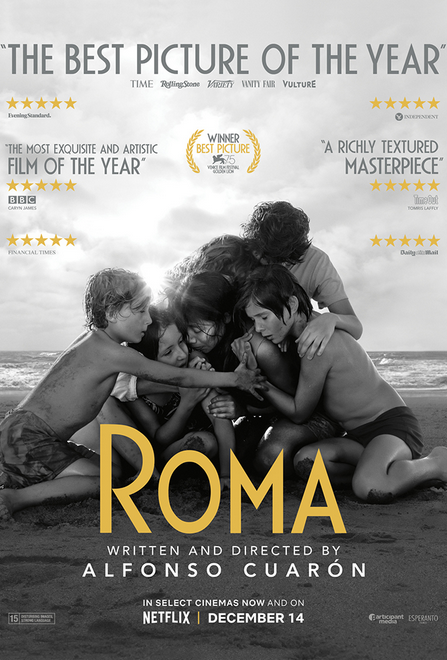Review: Roma
In the filmography of Alfonso Cuarón, “Roma” is an intriguing deviant. Mostly known for directing high-concept films like “Gravity,” Cuarón’s decision to make a quiet, slow, black and white drama can seem like tonal whiplash compared with the rest of his work. The question, however, was whether “Roma” could stand up on its own. This has most recently been met with a resounding ‘yes’ having garnered 10 Oscar nominations this past week including Best Picture.
Partially based on Cuarón’s own childhood, the film takes place in 1970’s Mexico. We follow the daily life of Cleo (Yalitza Aparicio), an indigenous maid in the house of a middle-class family. This is one of those movies where there’s no progression in the plot. It has a beginning and a climax at the end, but most of the film is just watching people interact. It reminded me a lot of “The Florida Project” in terms of pacing, where there’s no goal the characters are trying to accomplish other than living.
Thankfully, Cleo’s journey is captivating to watch. Her navigation through pregnancy, abandonment and divorce is harrowing and well-presented.
The film was shot in black-and-white, which gives the film an older feeling. Even though the film was shot with a digital camera, it looks and feels like it was shot using an older celluloid camera. This immensely helps draw the audience further into the story.
The choice to film the movie primarily in wide shots is inspired. The smooth movements of the camera and lack of editing gives the film an almost relaxing feeling. It also helps with audience immersion; without editing to constantly remind you you’re watching a film, you can surrender to the idea that what you’re watching is happening live right in front of you.
The film’s lack of score or soundtrack further adds to the realism. The quiet presentation of the on-screen drama gives a sense of fragility and honesty. There’s no orchestra telling you how to feel. There’s no licensed music to force some personality into the scene. There’s just you, the characters and your own responses to what’s happening.
Because this takes place during the Mexican Dirty War, the threat of violence and unrest constantly looms in the background. While the conflict isn’t explicitly focused on throughout much of the film, it provides the catalyst for what I believe is the point of the story. Near the end of the film, the peace and quiet are finally broken when Cleo is witness to the Corpus Christi massacre. People are running and shouting. Smoke flies through the air. A young woman is shown holding her lover as he dies.
At this same moment, Cleo’s own personal tragedy strikes. This calm display of life broken by chaotic death and suffering is the point of the narrative. Throughout the film, we’ve seen or heard people discussing the growing unrest as if it will never reach them. They have taken their security for granted, so when tragedy strikes them they are unprepared. Life is precious and could be stripped away at any moment, so don’t take anything as a given.
“Roma” is a stunning display of cinematic storytelling. Visually symbolic, but not indecipherable. Thematically universal, yet personally intimate. Slow, but not boring. “Roma” will grab anybody who watches it and won’t let go until the movie is over.







